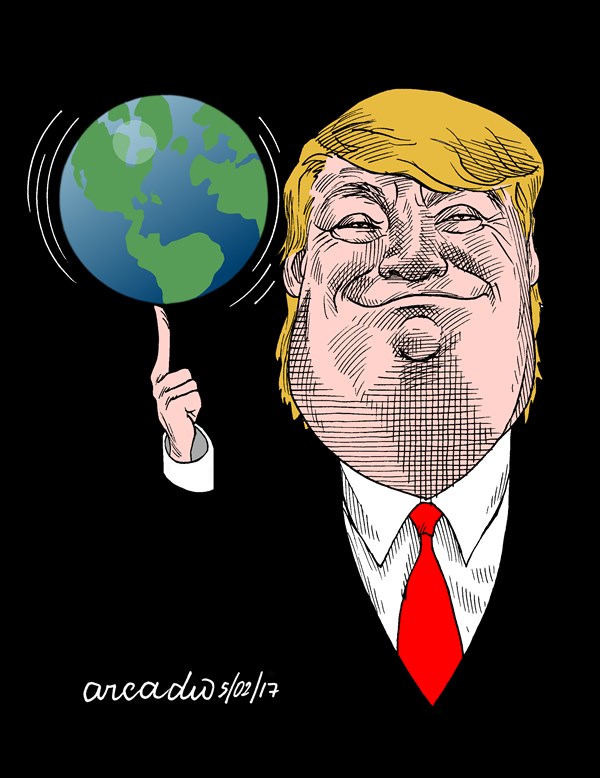
Petraeus said the strategy can work. But he also noted that it carried a disproportionate downside.
"There may, again, be some merit into the madman theory - until you get in a crisis," he said. "But you do not want the other side thinking you are irrational in a crisis. You do not want the other side thinking that you might be sufficiently irrational to conduct a first strike or to do something, you know, so-called 'unthinkable.' "
The growing standoff between the United States and Iran is providing a unique testing ground for this facet of Trump's foreign policy. While Trump has arguably used the "madman" strategy to some effect on the world stage, the question has always been what would happen if someone called his bluff and created an actual crisis.
And Iran may be trying to do just that.
Overnight, news broke that Iran had shot down a U.S. surveillance drone near the Strait of Hormuz. Both sides agree that that's what happened, though they disagree as to whether the drone was in Iranian airspace. The provocation comes shortly after the U.S. government officially blamed Iran for two attacks on oil tankers in the Gulf of Oman, and also after Iran declared it would soon pass the limits on uranium enrichment from the 2015 Iran nuclear deal from which Trump withdrew the United States.
Trump responded to the latest news Thursday morning by saying rather succinctly, "Iran made a very big mistake!"
Trump has, in recent days, actually slow-walked the idea of a possible armed confrontation. In an interview with Time magazine, he called the attacks on the oil tankers "very minor." He argued that such things wouldn't merit U.S. involvement because American interests aren't really at stake.
Trump offered some new comments Thursday that again seem to suggest a less-aggressive response. Appearing at the White House with Canadian Prime Minister Justin Trudeau, he said twice that it might have been a "mistake" by Iran, quite literally. He said, "I find it hard to believe that it was intentional" and suggested it was someone "loose and stupid who did it."
Asked how he'll respond, Trump said, "You'll find out."
For a president whose tough talk on Iran dates back decades, this is all quite discordant. A skeptic might say he was backing down in the face of Iran's provocations. Perhaps it's merely a tactic to continue looking unpredictable.
Whichever it is, though, Iran appears intent upon drawing Trump out and seeing whether his bite matches his bark. The situation is unlike others in which Trump has utilized some version of the "madman" approach and other countries have declined to escalate. Trump threatened North Korea with "fire and fury" and said he would "totally destroy" it, for example, but he and North Korean dictator Kim Jong Un have since talked about a potential deal.
He's launched an extensive trade war with China, but the two sides are at least still talking (even as fears of global recession are creeping in). More recently, he threatened bruising tariffs on Mexico if it didn't halt the flow of migrants to the U.S.-Mexico border, and Mexico appears to at least have made some concessions.
The Iran situation may never come to a head, either. Trump could also simply go the sanctions route - which appears to be his punishment of choice - and hope that takes care of it. But what if Iran keeps up the provocations? What if its actions more directly impact the United States, as the shooting down of a U.S. drone would seem designed to do?
Iran seems to be betting that Trump wants to avoid a Middle Eastern war and that he'll eventually make concessions. But doing so would come at a cost to Trump's pride. It would also risk making his decision to pull out of the Iran nuclear deal look as foolhardy as Democrats and European allies said it was.
It's a volatile mixture involving a president who has made volatility his calling card. And it appears to be the biggest testing ground to date for the wisdom of Trump's unwieldy foreign policy.
Sign up for the daily JWR update. It's free. Just click here.
(COMMENT, BELOW)


 Contact The Editor
Contact The Editor
 Articles By This Author
Articles By This Author